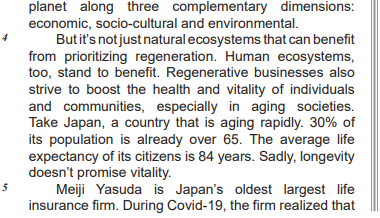Questões de Inglês para Concurso
Foram encontradas 16.706 questões
Read the text below:
The artwork "Meditation" comes from the series "Balance" and clearly shows the artist's extraordinary technique. The skin structure, which is created by underpainting with color glazes and salts, is reworked in a final step with oil paint in a specific painting technique, so that this lively, warm skin is created, which gives the bodies three-dimensionality and a transparency, as if one could look inside the person. In the painting "Meditation", the viewer is granted a deep insight into a pulsating female body, which outwardly remains in complete peace and harmony and surrenders to its meditative mantras, which are depicted as blossoms encircling the naked body. It is worth mentioning that this work is curated for the 8th Biennale Chianciano 2024 -Tuscany | Italy and will be exhibited there from August 3-18, 2024.
Judge the excerpts from the text:
Regarding English grammar, judge the following item.
The modal verb "must" in English is always used to
indicate obligation or necessity, and it cannot be replaced
by "have to" without altering the meaning of the sentence.
Regarding English grammar, judge the following item.
In English, the subjunctive mood is only used in
hypothetical situations and is identical in form to the
indicative mood in all tenses except the present.
Regarding English grammar, judge the following item.
In English, the use of double negatives is generally
considered grammatically incorrect and non-standard in
formal writing and speech, but it is acceptable and
commonly used in some dialects and informal contexts to
emphasize a negative meaning.
Regarding English grammar, judge the following item.
The English past perfect continuous tense is used
exclusively to emphasize the duration of an action that
was completed before another action in the past, and it
cannot be used in passive constructions.
Analyze the following statement about cognates and false cognates.
The English word "fabric" is a cognate of the
Portuguese word "fábrica," both referring to a place
where cloth or textile materials are produced.
Analyze the following statement about cognates and false cognates.
The English word "eventually" and the Portuguese
word "eventualmente" are false cognates, as "eventually"
indicates something that will happen at some point in the
future, while "eventualmente" means something that
happens occasionally or at irregular intervals.
Analyze the following statement about cognates and false cognates.
The English word "apparent" and the Portuguese
word "aparente" are false cognates, as "apparent" in
English means something that seems to be true or real
but may not be, while "aparente" in Portuguese means
something that is clearly visible or obvious.
Analyze the following statement about cognates and false cognates.
The English verb "to assist" and the Portuguese verb
"assistir" are cognates, both meaning "to help" or "to give
support."
Text 1
UN and Multilingualism
An essential factor in harmonious communication among peoples and an enabler of multilateral diplomacy, multilingualism is of particular importance to the United Nations. By promoting dialogue, tolerance and understanding, multilingualism ensures effective participation of all in the Organization’s work, as well as greater transparency and efficiencies and better outcomes.
Arabic, Chinese, English, French, Russian and Spanish are the six official languages of the United Nations; English and French being the working languages of the United Nations Secretariat.
Parity among the six official languages has been an ongoing concern of the Secretary-General. The use of all the official languages, on an equal footing, is actively promoted to guarantee that all stakeholders can participate in the work of the United Nations. To ensure that the goals and actions of the UN are understood by the widest possible public, non-official languages are also in use at the UN on a daily basis. To achieve these objectives, the UN Secretariat promotes an organizational culture in its ranks that values and nurtures multilingualism throughout the human resources continuum.
(adapted from:https://www.un.org)
Text 1
UN and Multilingualism
An essential factor in harmonious communication among peoples and an enabler of multilateral diplomacy, multilingualism is of particular importance to the United Nations. By promoting dialogue, tolerance and understanding, multilingualism ensures effective participation of all in the Organization’s work, as well as greater transparency and efficiencies and better outcomes.
Arabic, Chinese, English, French, Russian and Spanish are the six official languages of the United Nations; English and French being the working languages of the United Nations Secretariat.
Parity among the six official languages has been an ongoing concern of the Secretary-General. The use of all the official languages, on an equal footing, is actively promoted to guarantee that all stakeholders can participate in the work of the United Nations. To ensure that the goals and actions of the UN are understood by the widest possible public, non-official languages are also in use at the UN on a daily basis. To achieve these objectives, the UN Secretariat promotes an organizational culture in its ranks that values and nurtures multilingualism throughout the human resources continuum.
(adapted from:https://www.un.org)
About the topic “Pre-Communicative Methods”, complete the following sentence:
“The pre-communicative practice in learning a language is similar to learn to walk as a baby. Learning a language needs this .................... stage until you become ........................ in using your words and moving your tongue in your mouth to ........................ your words fluently and correctly.”
Mark the option that correctly completes the blanks in the text.



Available at: https://www.weforum.org/agenda/2024/06/businesses
-are-moving-beyond-sustainability-welcome-to-the-age-ofregeneration/. Retrieved on: Jun 14, 2024. Adapted.



Available at: https://www.weforum.org/agenda/2024/06/businesses
-are-moving-beyond-sustainability-welcome-to-the-age-ofregeneration/. Retrieved on: Jun 14, 2024. Adapted.



Available at: https://www.weforum.org/agenda/2024/06/businesses
-are-moving-beyond-sustainability-welcome-to-the-age-ofregeneration/. Retrieved on: Jun 14, 2024. Adapted.



Available at: https://www.weforum.org/agenda/2024/06/businesses
-are-moving-beyond-sustainability-welcome-to-the-age-ofregeneration/. Retrieved on: Jun 14, 2024. Adapted.



Available at: https://www.weforum.org/agenda/2024/06/businesses
-are-moving-beyond-sustainability-welcome-to-the-age-ofregeneration/. Retrieved on: Jun 14, 2024. Adapted.